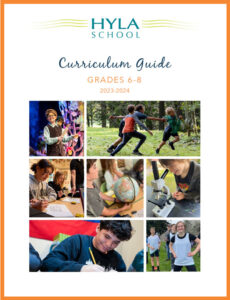Our Curriculum
Overview
The goal of our middle school curriculum is to develop educated students who actively enjoy learning, and who are able to analyze and think critically on their own. We believe that individual learning is best served by small classes. We are therefore intentionally sized to maintain a low student/teacher ratio in classes with ~16 students.
Hyla students learn in a dynamic environment which encourages academic excellence as well as the development of personal problem-solving strategies. For over 30 years, students who attend Hyla's middle school program have shown that they have the academic skills, future-ready tools, and self-confidence to join new learning communities and make positive contributions as they move through life - as students, athletes, student body governors, athletic team captains, community volunteers, leaders, colleagues, and activists.
Key Features
Responsive programming: As an independent school, our curriculum is responsive to current events, both local and global. Within established structures and goals, our academic units pivot to incorporate relevant issues, from the pandemic, to elections, to global events. These pivots connect classroom learning with the real world and allow students to apply knowledge in direct ways to their own lives.
Interdisciplinary curriculum: In grades 6-8, our academic program is composed of math, science, English, social studies/history, Spanish, drama, fine art, and global education. All three grades also take a human relations course designed to help our students develop a healthy identity and relate positively with the world around them. Students also take PE (what we call "human relations in motion") and Elective classes. We intentionally structure our curriculum to reinforce connections between subjects, believing that learning is more powerful as an interrelated process. Hyla teachers frequently collaborate to create hands-on and cross-disciplinary projects to deepen student learning.
Signature programs: In addition to weekly core classes, the middle school program also includes:
- Elective classes: several times a year, students choose from a diverse array of Elective classes that allow them to explore a new interest, dig deeper on an existing interest, try something new, and push themselves in a new environment.
- Exploration Week: At the end of each school year, students are immersed in a week-long, multi-age experience designed to take them into new territory - geographically, personally, interpersonally, and topically.
- Retreats: Each fall, retreats happen off-campus. Away from our daily routines, retreats ask students to work together to create shared agreements for the year ahead and establish a foundation of mutual trust and accountability for the rest of the year together. Retreats reinforce a shared framework and build connections between students as they build their own self-awareness as individuals, as members of a school community, and as classmates. What happens during retreats supports academic work, collaboration, community, and personal growth.
Choice and variety: We know that middle school students need choice and variety, and we honor both in our weekly schedule. Throughout the year, students have the opportunity to make choices to explore new subjects (like signing up for Electives), experience different student groupings (like Exploration Week), and mix up their learning environment, with some classes happening in classrooms, and others outside or off-campus. Each class uses a variety of experiences, approaches, and locations with an emphasis on active, participatory, and collaborative learning. Students can also choose where to eat lunch - inside, on the Cargo Net, under a tree - so experience independence and the chance to connect with different groups of students.
Intentional campus design: By design, our campus does not feature interior hallways. Instead, classrooms and buildings are connected by outside covered porches. The burst of fresh air between classes provides a chance to reboot and reset throughout the day. Teachers use different spaces around campus creatively to engage students, such as outdoor trigonometry, trail walks to inspire poetry, or specimen collection in science class. Our community hall is an important gathering space where student voice is center stage: students lead our weekly meetings, perform dramatic pieces, and have fun together at dances.
Student assessment: Hyla uses a non-graded system of assessment. In lieu of grades, we provide written evaluations twice a year, conduct parent-teacher conferences, and at the end of 8th grade students make a presentation to faculty and their parents reflecting on their own personal and academic growth during their middle school years. Parent teacher conferences are styled after Socratic seminars with teachers sharing reflections, anecdotes, and student work to show what students have accomplished and the work and growth ahead. For classroom work (tests, assignments, projects, presentations, etc.), teachers use numerical and letter-grade assessments to evaluate student work, but we do not issue a grade for overall performance at the middle school level (although grades are used in our upper school program).

